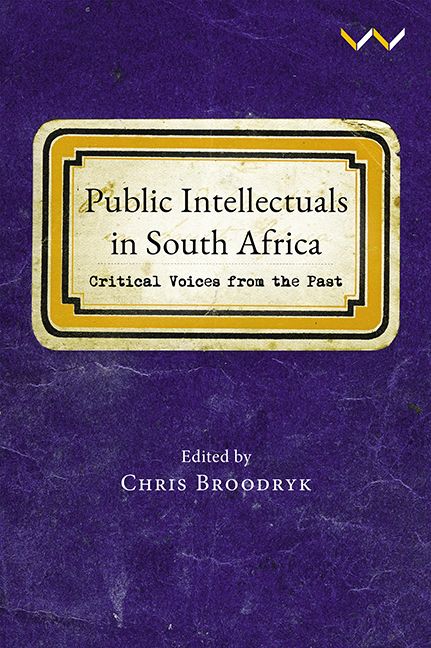Book contents
- Frontmatter
- Contents
- Acknowledgements
- Introduction: The Prismatic Nature of Public Intellectualism
- Chapter 1 Recalibrating the Deep History of Intellectual Thought in the KwaZulu-Natal Region
- Chapter 2 Elijah Makiwane and Early Black South African Public Intellectualism
- Chapter 3 Black Art Criticism in The Bantu World during the 1930s
- Chapter 4 In Conversation with the Nation: Sowetan’s Maverick Editor Aggrey Klaaste
- Chapter 5 William Pretorius and the Public Intellectualism of the Film Critic
- Chapter 6 Cultural Policy and the Arts: Mewa Ramgobin and Public Dialogue
- Chapter 7 ‘Kaalgat Critique’: The Public Intellectualism of Koos Roets as Afrikaans Satirist
- Chapter 8 The Public Intellectualism of Artivist Mandisi Sindo
- Chapter 9 The Janus-Faced Public Intellectual: Dr Thomas Duncan Greenlees at the Institute for Imbecile Children, 1895–1907
- Index
Chapter 6 - Cultural Policy and the Arts: Mewa Ramgobin and Public Dialogue
Published online by Cambridge University Press: 16 July 2022
- Frontmatter
- Contents
- Acknowledgements
- Introduction: The Prismatic Nature of Public Intellectualism
- Chapter 1 Recalibrating the Deep History of Intellectual Thought in the KwaZulu-Natal Region
- Chapter 2 Elijah Makiwane and Early Black South African Public Intellectualism
- Chapter 3 Black Art Criticism in The Bantu World during the 1930s
- Chapter 4 In Conversation with the Nation: Sowetan’s Maverick Editor Aggrey Klaaste
- Chapter 5 William Pretorius and the Public Intellectualism of the Film Critic
- Chapter 6 Cultural Policy and the Arts: Mewa Ramgobin and Public Dialogue
- Chapter 7 ‘Kaalgat Critique’: The Public Intellectualism of Koos Roets as Afrikaans Satirist
- Chapter 8 The Public Intellectualism of Artivist Mandisi Sindo
- Chapter 9 The Janus-Faced Public Intellectual: Dr Thomas Duncan Greenlees at the Institute for Imbecile Children, 1895–1907
- Index
Summary
The inclusive post-apartheid cultural policy that emerged from the politicaltransition of the 1990s is in clear contrast with the Rhodes Must Fallmovement of the mid-2000s. Initially focused on a statue at the Universityof Cape Town (UCT) that commemorated arch-imperialist Cecil Rhodes, one ofUCT's early benefactors, the campaign for the statue's removalgenerated a global movement to ‘decolonise’ education.
The two contrasting ‘transformation’ discourses of culturalpolicy and Fallism can be compared to the reassuring branding campaign ofdeterritorialised and evanescent ethnic harmony propagated by the Spursteakhouse chain from the late apartheid era to the present day. In contrastto Spur's depiction of pre-lapsarian innocence was the scathingNando's fast-food chicken political satire during the same period. Athird example is Castle Lager, which pioneered multiracial advertising fromthe late 1970s. These examples illustrate Mewa Ramgobin's positive,inclusive, dialectical and historically informed view of cultural policy inthe redefinition of post-apartheid identities. Monological, ahistorical andpath-dependent solutions perpetuate social conflict, he argues. A culturalactivist in Gandhian vein, Ramgobin (1932–2016) was a public figurewho helped to revitalise the Natal Indian Congress. He was a founding memberof the United Democratic Front (UDF), active in the Congress of SouthAfrican Writers (Cosaw) and he served as an African National Congress (ANC)Member of Parliament. Though not an academic, Ramgobin'sindependently constructed theory of cultural policy bore similarities toFoucauldian derivations of Australian cultural policy studies.
This chapter examines Ramgobin's cultural philosophy with regard toethnic representational inclusivity in his attempt to reorientate discussionfrom the narrow structuralist pessimistic Marxism of the 1970s and 1980stowards a fluid post-Marxism. Post-Marxism recognises that individualsembody contradictory consciousnesses and multiple subject positions, andthat they play multiple roles in cosmopolitan societies.
A BRIEF HISTORY
In contrast to conservative cultural theory (CCT), which developed coherentprinciples of cultural mobilisation during the first half of the twentiethcentury, ‘culture’ and ‘media’ studies aspotential sites of anti-apartheid struggle were largely ignored by liberaland radical scholars from the 1960s until the mid-1970s. The mechanisticleft-wing assumption was that that since the apartheid state owned the meansof production, distribution and regulation in broadcasting, performing artscouncils and some print media, it therefore also de facto controlledinterpretation, effects, uses and responses. In this view, the arts alsolacked hard social theory.
- Type
- Chapter
- Information
- Public Intellectuals in South AfricaCritical Voices from the Past, pp. 129 - 157Publisher: Wits University PressPrint publication year: 2021

